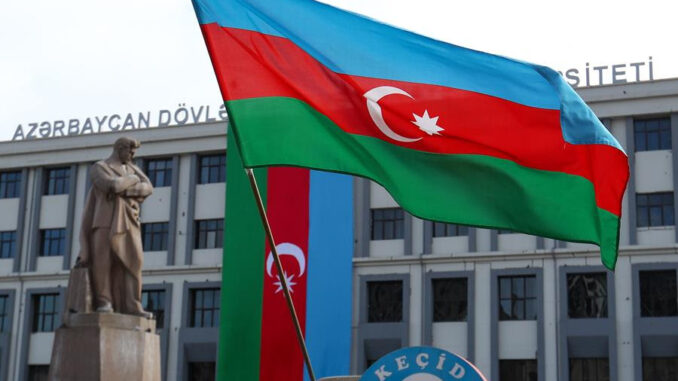
The Azerbaijani flag is displayed on November 28, 2020 in Baku, Azerbaijan. (Aziz Karimov/Getty Images)
Azerbaijan has presided over a tectonic shift in Eurasia, serving as a counterbalance to Iran while slipping out of Moscow’s bear hug more adeptly than any other post-Soviet state. In his latest essay, Dr. Michael Doran argues that Washington must partner with countries that are willing and able to do the hard work of containing our adversaries, and that Azerbaijan could provide a crucial bulwark against Russia and Iran.
See below for key takeaways, and learn more about the Center for Peace and Security in the Middle East, a new Hudson initiative led by Doran dedicated to bolstering American interests and allies in this pivotal region so that the U.S. can prevail in the new era of great power competition.
From Michael Doran’s article, “Azerbaijan in the Struggle for Eurasia” in the journal Baku Dialogues.
1. Azerbaijan’s Location is a Strategic Asset
Counterbalancing Russia is a primary duty of the United States, and the mere placement of Azerbaijan on the map makes it a crucial partner in that effort. The benefits of partnership extend well beyond Azerbaijan’s immediate neighborhood, the South Caucasus. The country is the sole gateway to the West of the former Soviet states of Central Asia.
2. Azerbaijan Prioritizes Independence from Russia
The Azerbaijanis have consistently made independence from Russia their national priority. The risks of pursuing such a goal have been high—as the Russian invasion of Georgia in 2008 and of Ukraine in 2014 demonstrate. Through [a] policy of low-key defense diversification, Azerbaijan managed to build a military that became entirely independent of Russia and trained to a NATO standard. No post-Soviet state has proved as adept as Azerbaijan at slipping free from Moscow’s bear hug.
3. Israel’s Energy and Military Ties to Baku Run Deep
Israel’s ties to Baku are long and deep, and they include strategic cooperation, with Israel receiving around 40 percent of its oil from Azerbaijan, to which it sells high-end military equipment, including some of the weapons and defensive systems that played a major role in Azerbaijan’s recent military victory.
The Iranians, for their part, have long assumed that Azerbaijan is assisting Mossad, Israel’s intelligence agency, in its covert war against their nuclear program. In 2012, Mossad (presumably) assassinated Mostafa Ahmadi Roshan, an Iranian nuclear scientist. In response, Iranian officials lodged a formal protest with the Azerbaijani ambassador in Tehran. Was the protest based on solid information, or were the Iranians simply leaping to conclusions? We may never know for sure, but even the uncertainty surrounding the episode speaks volumes about just how unnerving Iran’s leaders find Azerbaijan.
Quotes may be edited for clarity and length.



https://www.jns.org/opinion/why-iran-serves-as-protector-of-armenia/
https://www.i24news.tv/en
Wow! The world famous Russian cellist, Mtsislav Rostropovich was born in Baku, Azerbaijan. Both countries claim him.
“He is considered by many to be the greatest cellist of the 20th century.”
https://en.wikipedia.org/wiki/Mstislav_Rostropovich
I was looking up Azeri expatriates as I have never met any.
https://en.wikipedia.org/wiki/Azerbaijan%E2%80%93Israel_relations